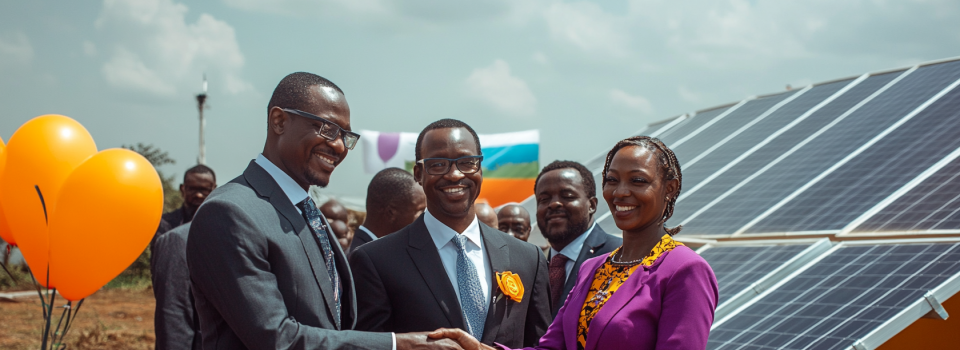Introduction
Course Overview
This comprehensive workshop equips participants with the necessary knowledge and skills to develop bankable solar photovoltaic (PV) projects, with a strong focus on Power Purchase Agreements (PPAs) and financial modeling techniques essential for project viability and financing.
Course Objectives
At the end of the workshop,
1. Participants will be able to understand the Zambia’s energy sector and its
challenges.
2. Participants will be able to understand the key components of a bankable
financial model.
3. Participants will be able to apply financial modeling techniques to solar
projects, considering relevant assumptions and inputs.
4. Participants will be able to develop a comprehensive financial model for a
solar plant and present it to potential investors
Course Outcomes
To empower participants with the knowledge and skills to develop bankable financial models for solar projects in Zambia, facilitating access to finance and contributing to the country's energy security.
Course Outline
Day 1: Open Ceremony and Introduction
Morning Session: Welcome Ceremony and Introduction to Energy
Landscape on Zambia and the Region
a) Welcoming and open of the training workshop
b) Current Electricity Utilization in Zambia and Region
c) Overview of Renewable Energy in Zambia
d) Regulatory Framework for Solar Energy in Zambia
e) Understanding the legal environment and policies
f) Importance of diversifying energy sources
g) Overview of ZESCO and its role in the Energy mix.
h) Stakeholders in Solar Projects
i) Introduction to Solar Energy
j) Global trends in solar adoption
k) Basics of solar photovoltaic (PV) technology
Afternoon Session: Power Purchase Agreements (PPAs) Introductions
a) Introduction to Power Purchase Agreements
b) Definition and importance of PPAs in energy projects
c) Types of PPAs (long-term vs short-term)
d) Key Components of a Bankable PPA
e) Essential terms and provisions to look out for
f) Risk allocation and mitigation strategies
g) Identifying key players (developers, financial institutions, governmental
bodies)
4.2 Day 2: Power Purchase Agreements (PPAs) and Excel Fundamentals
Morning Session: Power Purchase Agreements (PPAs)
a) Negotiating PPAs
b) Best practices for engaging with utilities
c) Case studies of successful PPAs in Africa
d) Challenges in Developing Bankable PPAs
e) Common pitfalls and how to avoid them
f) Addressing the issue of unbankable contracts in Zambia
Afternoon Session: Excel Fundamentals for Financial Modeling
a) Introduction to Excel for Financial Modeling
b) Overview of Excel’s features relevant to financial modeling
c) Creating a Basic Financial Model Structure
d) Setting up a spreadsheet for a solar power project
e) Key Financial Ratios and Metrics
f) Debt Service Coverage Ratio (DSCR) and Equity Internal Rate of Return
(IRR)
Page 4 of 6g) Calculating and understanding the importance of these metrics
4.3 Day 3: Excel Financial Modeling and Advanced Financial Structuring
Morning Session: Financial Modeling
a) Common Lender Covenants and Their Implications
b) Understanding covenants and modeling compliance in Excel
c) Sensitivity Analysis
d) Creating “what-if” scenarios and analyzing changes in key variables
e) Timing Flags and Cash Flow Management
f) Setting up cash flow schedules and linking them to financial metrics
Afternoon Session: Advanced Financial Structuring
a) Sources of Financing for Solar Projects
b) Overview of debt and equity financing options
c) Developing a Financial Model for a Solar PV Project
d) Structuring a comprehensive financial model (capital expenditure, operating
costs, revenue)
4.4 Day 4: Project Financing and Bringing It All Together
Morning Session:
a) Evaluating Financial Viability
b) Workshop: Developing financial models based on real scenarios
c) Risk Assessment in Financing Solar Projects
d) Identifying financial risks and mitigation strategies
e) Preparing Effective Project Proposals
f) Key components of a successful project proposal
g) Pitching to Investors
h) Techniques for presenting financial models and project viability
Afternoon Session:
a) Case Studies and Best Practices
b) Analyzing successful solar PV projects in Africa
c) Panel discussion with industry experts
d) Roadmap for Implementation
e) Developing a personal action plan for each participant
4.5 Day 5: Bringing It All Together – Pitching and Implementation
Morning Session:
a) Hands-on Excel Practice
b) Inputting assumptions and variables into a financial model
c) Calculating and analyzing DSCR, IRR, and conducting sensitivity analysis
Afternoon Session:
d) Group Exercises and Presentations
e) Collaborating on financial models and proposing solutions to real project
challenges
f) Presentation of findings and feedback session
g) Conclusion:
a. Certification of Completion
h) Networking opportunities and discussion on next steps for participants
Participants' Profile/Target Group
1. Potential Power Developers
2. Financial Analysts in the Energy Sector
3. Solar Companies
4. Mines
5. Ministry of Finance and National Development (PPP)
6. Ministry of Energy
7. Ministry of Justice
8. Ministry of Small and Medium Enterprises Development
9. Energy Regulation Board
10.Rural Electrification Authority
11.Zambia Development Agency
12.Zambia Railways and TAZARA
13.NAPSA
14.Workers Compensation
15.Zambia Power Development Framework
16.Solar Industry Association of Zambia
17.Zambia Chamber of Commerce and Industry
18.Zambia Association of Manufacturers
19.Zambia Renewable Energy Network
20.Lunsemfwa Hydro Power
21.Audit Firms (PWC, DELOITTE, E&Y, HLB)
22.DEFENCE (ZAF, ARMY, ZNS)
23.CEEC
24.CEC
25.ZRA
26.Universities and Colleges (MU, UNZA, CBU, UNILAS, MUKUBA, HONE, ZICTU,
NORTECT, ZCASU, KAPASA)
27.Banks (ZANACO, INDO, FNB, ABSA, ACCESS, STANBIC, STANDCHART)
28.GreenCo
29.Individual Participants

